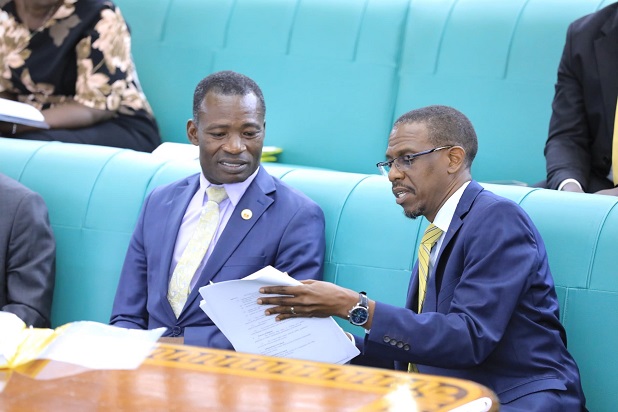Parliament has approved the loan worth US$70M equivalent to Shs 265.318Bn for the construction of a new home for Uganda Heart Institute at Nakawa.
This followed a motion by Ministry of Finance, seeking parliamentary approval to borrow up to US$ 20 Million from the Arab Bank for Economic Development in Africa (BADEA), US$ 30Million from the Saudi Fund for Development (SFD) and US$ 20Million from the Opec Fund for International Development (OFID) for the construction and equipping of the Uganda Heart Institute.
While presenting the report on the loan request, Robert Migadde, Vice Chairperson Parliament’s Committee on National Economy, revealed that during the scrutiny of the loan request, the Committee was informed that globally, over 76% 0 of cardiovascular deaths occur in low and middle income countries, of which 80% are due to heart attack 7.4 million and stroke 6.7million people.
He also added that it is estimated that one in four adults or about 25% of Uganda’s population has high blood pressure which can lead to Cardiovascular diseases, stroke or kidney failure and the situation is worsened by the 27% chance of Ugandans aged, between 30 and 70 years dying of Non-Communicable Diseases, with Cardiovascular disease accounting for 9% of these deaths.
Migadde revealed that the Heart Institute’s current home in Mulago Hospital is limited by space for expansion and although the Institute desired 30acres of land, only 10acres were allocate on the Nakawa-Naguru failed satellite city project.
He said, “For instance when the Committee visited the Uganda Heart Institute, there were equipment lying in the corridors because they could not be installed due to limited space. The Uganda Heart Institute has a modern cardiac cathetarisation facility and dedicated cardiac operation theatre with the capacity to handle over 100 operations per year. However its operating capacity is at only 45% due to limited space and care services.”
Lucy Akello (DWR Amuru) supported the loan calling on the top management to put the loan to good use arguing, “I think it is time for us to support the Uganda Heart Institute but even as we do this in good faith, the Parliament, it is usually abused when it comes to implementation, a lot of money is misused in procurement but I want the money to be put to good use.”
Sarah Opendi (DWR Tororo) described the loan as long overdue, arguing it will help reduce on number of people seeking for treatment abroad saying, “This particular loan is long overdue. The Uganda heart Institute has built capacity, there is no need for referrals abroad save for either 5 or 10% of the complex cases. Most of the cases can actually be handled here by the specialists and the staff.”
Nakawe West’s Joel Ssenyonyi asked Deputy Speaker to ensure that when projects of such magnitude are being undertaken, Parliament is given an update every two months, to avoid scenarios of Parliament carrying out their oversight roles when projects are in a crisis and asked Government to ensure money is put to good use.
He said, “Many times money is released for a good cause but it ends up being swindled, being misappropriated and who suffers at the end of the day it is the end user. We are hoping that there will be a difference this time around, that we follow the procurement regulations as is, many of the challenges we are having with entities is that people just flout procurement regulations.”
Deputy Speaker, Thomas Tayebwa asked MPs to back the loan revealing that every year, the Heart Institute sends away 300 children because the institution doesn’t have room to handle their cases.
“They have the expertise, they have some of the equipment but they don’t have where to operate from. And the day you take a patient to the Uganda Heart Institute, I have ever taken one and you find these dedicated people trying to fix you even in the corridor to work on you but their complicated machines can’t be taken anywhere is where you feel the pain. You can save that Ugandan who can’t have capacity to fly abroad,” sai9d Tayebwa.
When the question was put to MPs to whether approve loan or not, lawmakers voted to approved the loan.




